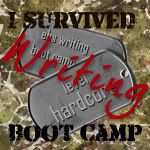Emergency Beta Service offers to provide quick answers to any questions you might have concerning grammar, summaries, and/or insignificant plot points. Teasers (up to 250 words) are also accepted.
The goal is to answer within two hours of receiving the question (in their opening hours ;-) ).
You can follow Emergency Beta on Twitter.
The Staff of Emergency Beta is our guest for this week's Writing Lab.
10 Tips to Make Your Betas Love You
Yes, betas can love, too. A good beta should comment on all the little details that seem off, while giving you some much needed love and care for the baby that took you hours to birth. Your chapters should be filled with red marks, not only commenting on grammar, but also on the fabulously constructed sentences, the intriguing details, and that awesome character flaw you gave Alice. The biggest reason for betas not to show this love is simply obvious grammar errors every writer should be able to avoid.
So what is it that makes your betas want to tear their hair out as they go through your chapter? Here is a list of items that my fellow betas and I have come up with, along with some tips on how to fix or avoid them.
- Example: “Hello, Bella.” “So, slugger, you’re a doctor now?” “Don’t be so stubborn, dear.”
2. Commas before or after dialogue tags: the second easiest comma rule! And what exactly is a dialogue tag, you ask? It is anything following or preceding dialogue (inside the quotes) that describes the manner of the dialogue being presented.
- Example: “Hello,” he shouted. He whispered, “Don’t tell anyone.”
- Note: even if the dialogue tag comes before the actual dialogue, there is still a comma, and the first letter of the speech should be capitalized—unless it’s a continuation of a sentence from before the tag. Example: “You would think,” she said, “that he would learn from his mistakes.”
- Check here for a list of dialogue tags.
3. Use your spell check! Some spell checkers are better than others, so if you think you have the word right when spell check says otherwise, google it or look it up in a dictionary. A lot of the time, spell check is right. If your word processor doesn’t have built-in spell check, here is a free one online.
4. Homophones. If your spelling is poor, it’s hard to remember the difference between week and weak, or waist and waste (a spelling error I made frequently in grade school, and I still google it whenever I use either one, just to be absolutely sure). A good spell check will put blue squiggly lines if it thinks you’re using the wrong word or phrase. However, for many, it’s just something you have to learn—and good writers should put in the effort to learn it! Google is your friend.
- Did you know that if you type in the search bar define [insert word] it will show you the top definitions of that word? And you can click More for more!
- Try to come up with mnemonic strategies to learn the difference (like I frequently have to remind my sister, “where and here; were and are”).
5. Notice the changes your beta is suggesting! Often, the beta will tell you why they’re suggesting the change, but when they don’t, try to notice a pattern. When betas can’t be bothered to put in an explanation, it’s usually because the error is so basic or that they’ve already pointed out the rule, maybe even several times. Sometimes your betas don’t even know the rule, but they have learned the pattern from someone else. If you’re not sure why your beta suggested the change, try googling for a rule or ask EBS!
6. Make sure all the tenses are consistent. If you’re writing in past tense, there should be no verbs in the present tense! You can use simple past (write → wrote), past perfect (write → had written), past continuous (write → was writing), or past perfect continuous (write → had been writing). You should also shy away from words like now, here, today, tomorrow, yesterday, this, these, etc. They all indicate present tense and will often break the past tense flow.
- Note—if you’re writing in past tense and/or 1st person, you really shouldn’t be using the 2nd person pronoun “you.” It’s bad form. Many people will tell you to avoid it when writing in present tense and/or 3rd person as well, but I personally say that then it’s more a question of writing style.
7. Apostrophes. They are only ever used:
- in contractions (you are → you’re);
- to show the possessive of nouns, but never pronouns (the man’s dog → never you’re dog);
- Note that the plural possessive goes after the plural S (The Cullens’ house, his parents’ house, etc.). Some people prefer to add an additional S after the apostrophe (e.g. The Cullens’s house), but if you do, remember to be consistent!
- when something has been removed from the word, like in contractions or when pointing out a g-dropping accent (hitting → hittin’).
- The easiest way to remember when to use apostrophes is to ask yourself if you can insert something instead. You’re and they’re can obviously be changed to you are and they are, you can add a g to hittin’, and the possessive? Well, that is really clever, actually. The possessive apostrophe started out as a contraction of the noun and the possessive pronoun, e.g. this is the man his dog. This is why it doesn’t work with pronouns; you would never say this is your your dog (not even in the old days)! Clever, right?
8. Overuse of the word that. Did you know that people use that 80% more in writing than in speech? It really isn’t used as often we think. I might be making up the number, but the truth is, it is used too much in writing, and often it can be removed.
- Example: “the reason that it broke” → “the reason it broke.”
- Then of course is the misuse of that where it should be replaced with which. Check Grammar Girl for a good explanation of that vs. which.
- However, when in reference of a person, it should always be who—unless it’s a question of which one you’re talking about.
9. Jumps in time—if there are any in your chapter, make it clear. Either mention it in the text (which can easily be done in 3rd person and/or past tense writing), or mark it off with a page break. If you are suddenly writing a scene that happened three weeks after the last scene and you don’t make that fact clear, it will be disorienting for both the reader and the beta. Same goes for sudden flashbacks.
- When writing flashbacks, I would recommend using the tenses and a play on the narrative as a tool to indicate the time change instead of putting whole paragraphs into italics. You’re writing in the past tense? Use past perfect to indicate the event happened further in the past. Writing in present tense? Use simple past or past perfect to indicate that it’s not happening now. Then you can also tone back the dialogue and tell the reader what happened, rather than show.
- Don’t know the difference between show and tell in writing? Click here for a great article about the subject!)
10. Use two betas! You can never have too many pairs of eyes looking through your chapter. Even the best novels go through multiple editors and are read time and time again before it goes to print, and still there are errors. Every beta has a different set of skills in her armory, so even if one of your betas isn’t particularly good with commas or explaining the rules of why that comma should be there, the other might be able to make up for that.
- Submit your story to Project Team Beta and find a pair of permanent betas that complement each other and fit your style, or you can submit it to Sparkly Red Pen, who will accept up to 5 of your chapters and will work closely with you to help you improve your writing !
There you have it! Some of these tips might look more complicated than others, but the key is to google or ask around. The second or third chapter you submit to your beta might make or break your writer-beta relationship because those will show if you are truly taking in their comments. Once you actively start avoiding the mistakes your betas have pointed out to you, your writing will improve. One day your grammar might even be good enough for you to be able to coach someone else through their writing experience!
We here at Emergency Beta Service encourage both writers and betas to ask for second opinions or grammar rules and to ask when they get stuck on something. It can be for clearing up differences in opinions and confusion or helping the writer improve independently. We are generally available from 7am to 12am EST every day, but follow us on Twitter @emergencybeta for further information about who is on duty and when.
Rags, EBS Admin and Beta
Thank you, Rags!
An excellent post, isn't it?
As usual, your comments are welcome!



























Fantastic post! The links you gave were also awesome. You do sound like you're promoting "telling" rather than "showing," though, which I'm sure you didn't mean to do as the link provided was very good at explaining it as the preferred method (I find a lot of ffns tell too much as it is ;-)). I'll be referring your article to my authors. Thanks so much for all your work in writing this.
ReplyDeleteThank you for your comment!
ReplyDeleteThe article wasn't meant to promote telling vs. showing, but was focused on the grammar check more than on the story content...telling vs showing is another topic for another time :-)